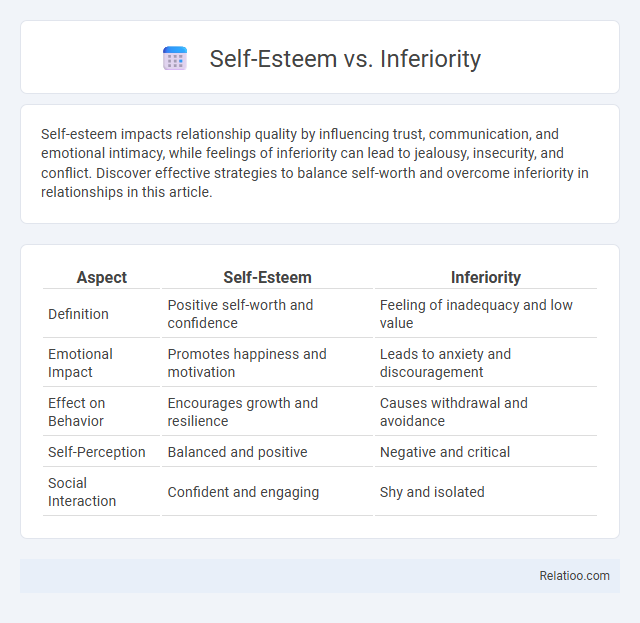Self-esteem impacts relationship quality by influencing trust, communication, and emotional intimacy, while feelings of inferiority can lead to jealousy, insecurity, and conflict. Discover effective strategies to balance self-worth and overcome inferiority in relationships in this article.
Table of Comparison
| Aspect | Self-Esteem | Inferiority |
|---|---|---|
| Definition | Positive self-worth and confidence | Feeling of inadequacy and low value |
| Emotional Impact | Promotes happiness and motivation | Leads to anxiety and discouragement |
| Effect on Behavior | Encourages growth and resilience | Causes withdrawal and avoidance |
| Self-Perception | Balanced and positive | Negative and critical |
| Social Interaction | Confident and engaging | Shy and isolated |
Understanding Self-Esteem and Inferiority
Understanding self-esteem involves recognizing your intrinsic worth and confidence in abilities, which fuels motivation and resilience. Inferiority arises from persistent feelings of inadequacy and self-doubt, often hindering personal growth and well-being. Balancing these concepts is essential for developing a healthy self-concept and overcoming challenges effectively.
Core Differences Between Self-Esteem and Inferiority
Self-esteem reflects Your overall sense of self-worth and confidence, while inferiority is characterized by feelings of inadequacy and self-doubt. Core differences include that self-esteem fosters positive self-regard and resilience, whereas inferiority often leads to negative self-perception and decreased motivation. Understanding these distinctions helps in identifying whether Your mindset leans towards empowerment or self-limitation.
Psychological Roots of Inferiority Feelings
Inferiority feelings stem from early psychological experiences such as childhood neglect, criticism, and unmet emotional needs, which shape your self-perception and sense of worth. These roots contrast with healthy self-esteem, which develops through positive reinforcement, personal achievements, and supportive relationships. Understanding these foundational causes is essential for addressing feelings of inferiority and fostering a balanced sense of self-worth.
The Impact of Self-Esteem on Mental Health
Self-esteem significantly influences mental health by affecting emotional resilience and vulnerability to disorders such as depression and anxiety. High self-esteem promotes positive self-regard, enhancing coping mechanisms and psychological well-being, whereas low self-esteem correlates with increased feelings of inferiority and susceptibility to mental health challenges. Addressing self-esteem issues is crucial in therapeutic interventions to mitigate the adverse effects of inferiority complexes and improve overall mental health outcomes.
Childhood Influences on Self-Esteem and Inferiority
Childhood influences significantly shape the development of self-esteem and feelings of inferiority through early interactions, parenting styles, and social experiences. Positive reinforcement, supportive environments, and secure attachments foster healthy self-esteem, while neglect, criticism, and bullying contribute to a persistent sense of inferiority. Early emotional experiences lay the foundation for an individual's self-concept, affecting confidence and vulnerability to feelings of inadequacy throughout life.
Social Factors Shaping Self-Perception
Social factors such as peer relationships, family dynamics, and cultural expectations significantly influence your self-esteem and feelings of inferiority. Positive social interactions and support foster healthy self-perception, while negative experiences like rejection or criticism can deepen a sense of inferiority. Understanding these social influences is key to developing a balanced self-esteem and overcoming feelings of inadequacy.
Recognizing Signs of Healthy vs Low Self-Esteem
Healthy self-esteem manifests in confidence, resilience, and a positive self-image, allowing individuals to embrace challenges and recover from setbacks effectively. In contrast, signs of low self-esteem or feelings of inferiority include persistent self-doubt, fear of failure, and avoidance of social interactions, often accompanied by negative self-talk and a distorted self-perception. Recognizing these signs is crucial for fostering emotional well-being and implementing strategies that promote self-acceptance and personal growth.
Strategies to Overcome Inferiority Complex
Overcoming an inferiority complex involves strategies such as cognitive restructuring to challenge negative self-beliefs and building self-esteem through positive affirmations and goal-setting. Engaging in social skills training and seeking support from therapy or counseling can enhance self-confidence and reduce feelings of inferiority. Consistent practice of mindfulness and self-compassion promotes emotional resilience, helping individuals recognize their intrinsic worth and counteract inferiority thoughts.
Building and Sustaining Positive Self-Esteem
Building and sustaining positive self-esteem involves recognizing your unique strengths while addressing feelings of inferiority that may undermine confidence. Developing a balanced self-view empowers you to challenge negative thought patterns and fosters resilience against self-doubt. Consistent self-reflection and affirming experiences contribute to a durable sense of self-worth, counteracting the impact of inferiority complexes.
Self-Esteem, Inferiority, and Life Success
Self-esteem plays a crucial role in shaping your confidence and ability to achieve life success, as it reflects your overall sense of self-worth and belief in your capabilities. Inferiority feelings, on the other hand, can undermine motivation and hinder progress by fostering doubt and negative self-perception. Cultivating a strong sense of self-esteem enables you to overcome challenges, build resilience, and pursue goals effectively, ultimately leading to greater fulfillment and achievement.

Infographic: Self-esteem vs Inferiority
 relatioo.com
relatioo.com